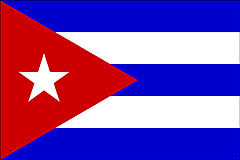
By Lou Chibbaro Jr.
Raul Hernandez, a gay man who defected from Cuba in 1993 to live in Brazil, had hoped to obtain permanent U.S. residency under the 1966 Cuban Adjustment Act after he arrived in 2000.
Congress passed the Cold War-era act to provide an expedited and mostly automatic approval process for Cubans seeking refuge in the United States from Cuba’s Communist government, which U.S. officials and human rights advocates labeled as highly oppressive.
But following a lengthy application and appeal process, Hernandez, 40, who lives in Arlington, Va., was turned down for admission under the Cuban Adjustment Act in 2005 because he’s HIV positive.
U.S. immigration officials told him that the longstanding U.S. ban on HIV-positive visitors and immigrants — a part of U.S. law and regulation — would take precedent over the Cuban Adjustment Act.
Last year, Congress repealed the law that put in place the HIV visitor and immigrant ban. However, the ban remains a part of regulations governing admissibility of immigrants under the U.S. Department of Health & Human Services’ handling of infectious diseases.
The Obama administration has taken steps to repeal the regulation, but the bureaucratic process for repealing the regulation is not expected to be completed until later this year or early next year, according to HHS officials.
Meanwhile, Hernandez has put aside his application under the Cuban Adjustment Act and has applied for U.S. political asylum, which is not influenced by his HIV status.
Hernandez, who works as a caseworker assisting HIV patients at Washington’s La Clinica Del Pueblo, was considering but had yet to agree to an interview for this story.
His asylum application comes at a time when President Obama and Secretary of State Hillary Clinton are reviewing U.S. policies toward Cuba. Some members of Congress are calling for the lifting of U.S. economic sanctions against the government of Raul Castro, brother of longtime Cuban dictator Fidel Castro.
Hernandez’s attorney, Christopher Nugent, has filed legal briefs with immigration officials pointing to anti-gay persecution in Cuba. The briefs also state that Cuba has a longstanding policy of “isolating” HIV-positive Cubans by placing them against their will in treatment facilities known for failing to provide adequate medical care.
An immigration official initially rejected Hernandez’s asylum application April 1, saying the gay Cuban failed to provide adequate evidence that he would face government-sanctioned persecution if he were to return to his homeland.
Another official has since reinstated the asylum application after Nugent asked the earlier ruling to be reconsidered on grounds that the first official didn’t take into consideration the voluminous documentation submitted by Nugent indicating Hernandez would face incarceration and possible torture if forced to return to Cuba.
Nugent said Hernandez could have received an exemption from the HIV immigrant ban if he had “qualifying family members” in the U.S. But a legal filing shows Hernandez has no close relatives in the country, and his parents and siblings in Cuba are affiliated with the Communist Party and have long since disowned him.
“Mr. Hernandez … established that there exists a pattern and practice of state-sponsored and condoned persecution of political dissidents, openly gay men, and people with HIV,” Nugent says in one of his briefs.
“These people are commonly quarantined in sanatoria, obviously in violation of their human rights, and/or sent to military prisons when considered dissidents,” he says.
“Due to his defection to the United States, Mr. Hernandez will be treated as an enemy of the state,” Nugent says, meaning Hernandez likely would be “imprisoned and tortured due to his opposition to the Cuban government, as evidenced by his defection.”
Upon being “imprisoned in a sanatoria or military prison by virtue of his dissidence and homosexuality,” Nugent says in one of the briefs, Hernandez “will be invidiously provided inferior medical care, which will only accelerate his demise from complications of his HIV disease.”
Nugent says that Hernandez has developed a resistance to a number of widely used anti-viral medications used to treat HIV, raising concern that more sophisticated treatment regimens may not be available to him in Cuba.
Spokespersons for the Cuban Interest Section in Washington, which serve as an unofficial Cuban embassy to the U.S., could not immediately be reached. A spokesperson for the Cuban Mission to the United Nations in New York did not return the Blade’s call.
Hernandez’s application and appeal process for Cuban Adjustment Act admissibility — for which the Whitman-Walker Clinic’s legal department represented him — lasted until 2005. At that time, Nugent’s law firm, Holland & Knight, agreed to take Hernandez’s case on a pro-bono basis.
Source
Saturday, 23 May 2009
HIV immigrant ban complicates Cuban’s US asylum request
Labels:
cuba,
Hillary Clinton,
immigration,
new york,
obama,
USA
♦ Add to del.icio.us ♦ DiggIt! ♦ Add to Reddit ♦ Stumble This ♦ Add to Google Bookmarks ♦ Add to Yahoo MyWeb ♦ Add to Technorati Faves ♦ Slashdot it ♦
Subscribe to:
Post Comments (Atom)







 Join our page
Join our page


0 comments:
Post a Comment